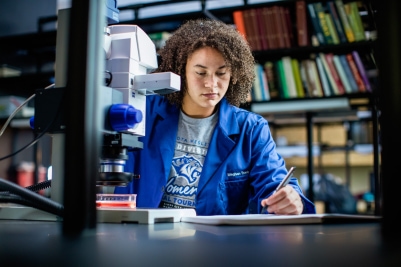Wildlife Management
Make the Great Outdoors Your Office
What careers will you find with a
wildlife
management degree?
Wildlife biologist
Conservation officer
Fisheries biologist
Game farm manager
Zookeeper
What’s the Difference at DWU?
- You’ll have access to private rural land to conduct research, restoration and preservation of native prairie habitats.
- Find internship opportunities with the South Dakota Department of Game, Fish, and Parks, the National Parks Service, and the South Dakota Department of Health.
- Work on projects involving habitat management, conservation, and other research areas.
- Conduct advanced independent research using the biological methods you have learned through your coursework for your senior capstone project.
- Interested in becoming a conservation officer? Then pick up an emphasis in Wildlife Law Enforcement.
Wildlife Management Courses
Check out the courses on the way to completing your Wildlife Management degree.
BIO 120 Principles of Biology I
Prerequisite or corequisite: BIO 120L
BIO 122 Principles of Biology II
Prerequisite: BIO 120/120L
Corequisite: BIO122L
BIO 301 Biostatistics
BIO 302 Ecology
BIO 311 Invertebrate Zoology
BIO 315 Genetics
Prerequisites: BIO 122/122L
Prerequisite or corequisite BIO 315
BIO 316 Evolutionary Biology
BIO 318 Botany
BIO 323 Mammalogy
BIO 324 Ornithology
BIO 325 Principles of Wildlife Management
BIO 344 Immunology
Prerequisites: BIO 122/122L, and CHM 174/174L or CHM 231/231L or consent of instructor
Prerequisite or corequisite: BIO 344L
BIO 346 Intro to Molecular and Cell Biology
BIO 400 Research Problems in Biology
Prerequisites: BIO 122/122L, an approved proposal and consent of instructor
BIO 450 Internships
MTH 210 Calculus I
Prerequisite: MTH 135 or math placement.
PHS 100 Physical Science: Physics and the Atomic Nature of Matter
PHS 260 University Physics I
Prerequisite: MTH 210
Corequisite: PHS 260L
Get to Know Your Professors
Embrace learning with our skilled teachers. Our low student-to-faculty ratio offers valuable one-on-one interaction with your professors.
Brian Patrick, Ph.D.
Tim Mullican, D.A.
Concentration in Wildlife Law Enforcement
Our concentration in wildlife law enforcement is the only program of its kind in South Dakota. This selection of classes gives you a background in criminal justice and communication while you earn your wildlife management degree.
As a wildlife conservation officer, you will:
- Protect wildlife populations
- Ensure fair and equitable use of natural resources
- Protect state property
- Enforce hunting and fishing laws
Throughout your career, you will interact with thousands of sportsmen and women. You will perform fish and wildlife surveys, work with nuisance wildlife, and take classes on wildlife management, hunter education, trapping and fishing.
You'll need to be well-versed in the laws concerning wildlife and how to communicate these laws effectively with those who use the areas you protect.
Your law enforcement emphasis will prepare you for making arrests, executing search warrants, investigating reported violations, preparing affidavits and testifying in court.
This emphasis will give you a working knowledge of the American legal system, including:
- Criminal investigation techniques
- Arrest procedures
- Communication skills needed for working with the public
Take classes like:
- American Legal Systems
- Criminal Procedure
- Interpersonal Communication
Research Opportunites
DWU faculty involve undergraduates in their own research, as well as encourage them to obtain internships beyond DWU’s campus to develop future employment opportunities.
Our faculty members are active professionals in research and grant writing. They stay up to date in modern techniques of wildlife management and have years of hands-on experience in the field.














